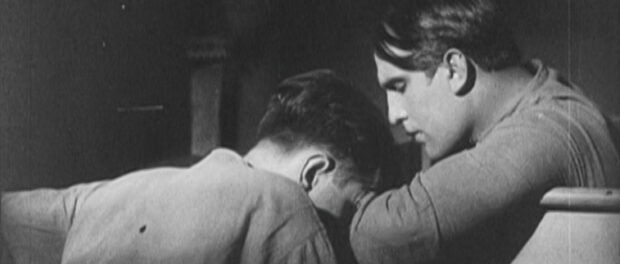Sex in Chains (1928)
[7]
William Dieterle (The Hunchback of Notre Dame, The Devil and Daniel Webster) directs and stars in this transgressive German silent film about a married couple who endure prolonged, maddening abstinence after the husband (Dieterle) is sentenced to three years in prison. While Dieterle develops a same-sex relationship with one of his cell mates, his wife (Mary Johnson) retreats into the arms of her kindly employer (Gunnar Tolnæs). As Dieterle’s release date looms, the two struggle with whether or not to confess their sins.
Sex in Chains has an overly-long first act, but once the prison sentence begins, the movie starts to boil with sexual frustration. ‘Blue Balls’ is portrayed as a form of torture. One of Dieterle’s cell mates even tries to castrate himself. The performances and direction are often laughable, literally bringing characters to the brink of insanity. At one point, Mary Johnson sees her husband’s face in a jacket, then on the bed, and then everywhere. She’s driven into delirium, running through the streets and banging on the prison doors yelling, ‘My husband! My husband!’ For whatever reason, masturbation is never mentioned as an option for these poor, suffering people. Adding to the camp factor is a dreadfully serious subplot in which Tolnæs’ character petitions an elected official to change the law so that married couples can have conjugal visits.
As overwrought as the movie is — including its doozy of an ending — Sex in Chains is also remarkably subtle and restrained in other areas. Dieterle’s relationship with his cell mate (The Cabinet of Dr. Caligari‘s Hans Heinrich von Twardowski) develops honestly, without sentiment or salaciousness. While Dieterle’s gay experience is portrayed as one of circumstance, Von Twardowski’s character still pines for him after they are released. The gay character is not at all portrayed in a negative light. Despite the threat his character poses to Dieterle’s and Johnson’s marriage, neither of them indulge in any homophobia. Pretty refreshing, especially for 1928.
Dieterle’s direction includes some beautiful transitions between scenes and a lot of double-exposure shots. Dream scenes give the director a chance to show off his skill with close-ups and juxtaposition. The acting is uneven, with Dieterle giving the most grounded performance and Johnson sometimes partaking in exaggerated pantomime. Sex in Chains is too melodramatic to completely survive the ‘test of time.’ But with its mix of progressive sociology and camp psychological horror, it’s simply too much of a brave oddity to ignore.


